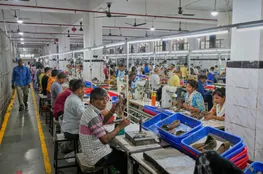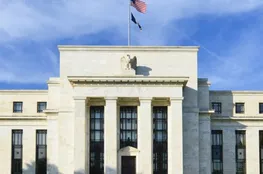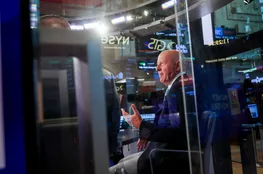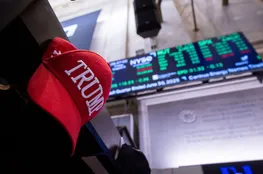Former President Donald Trump has consistently touted tariffs as a panacea for various economic challenges, ranging from the decline in U.S. manufacturing to undocumented immigration and childcare costs. A staunch proponent of tariffs, Trump recently reiterated his stance at the Economic Club of Chicago, describing tariffs as 'the most beautiful word in the dictionary.' However, while Trump's rhetoric has focused on economic resurgence, he frequently omits the potential for a global trade war, a plausible fallout if foreign nations retaliate by imposing taxes on U.S. imports.
According to economists consulted by ABC News, the likelihood of a global trade war is virtually certain if Trump's proposed tariffs are implemented. This could severely curtail U.S. exporters' sales, impacting approximately 10% of the nation's economy and leading to possible job losses and a slowdown in economic performance. Conversely, a number of economists argue that the move might drive certain supply chains back to U.S. territory, potentially fostering growth and employment in firms shielded from international competition. Despite these possible gains, experts warn that they are considerably overshadowed by the broader negative consequences.
Douglas Irwin, an economics professor at Dartmouth College, remarked on the discretionary yet enduring nature of tariffs. He explained that while tariffs are effortlessly instated, removing them is a far more difficult endeavor. During the Trump campaign's engagement with ABC News, Senior Advisor Brian Hughes dismissed expert forecasts that predict adverse economic outcomes, citing past projections that were contradicted by subsequent employment and growth gains.
Nevertheless, Trump's campaign promises include a significant ramp-up of tariffs during his potential first term. Targeting specifically Chinese products, Trump suggested tariffs ranging from 60% to 100%, alongside a broad tax of 10% to 20% on all imported goods. At the Economic Club of Chicago, he remarked that such tariffs might soar to 50%. Economists largely predict these measures to inflate consumer prices, as importers often shift the burden of higher taxes to buyers. Estimates from the Peterson Institute for International Economics suggest that Trump's tariffs could cost the average U.S. household around $2,600 annually.
Should foreign countries retaliate with their own tariffs, the repercussions could extend further. Kara Reynolds from American University hypothesized that U.S. exports might face a drastic downturn, directly impacting employment in export-driven sectors like manufacturing and agriculture. Historical instances, such as the tariffs during Trump's first term that elicited reciprocal measures from the European Union and Canada, serve as precedent. A notable outcome was China's extensive tariffs on U.S. soybean exports, which significantly diminished sales from $12.3 billion in 2017 to $3.1 billion in 2018, prompting the U.S. government to compensate farmers with substantial financial aid.
According to Robert Lawrence from Harvard University, large-scale tariff impositions on a greater magnitude would likely prompt countries to seek alternative trade partnerships, marginalizing the U.S. in global trade networks. Despite these concerns, Trump refutes such pessimistic forecasts, claiming tariffs would revitalize U.S. manufacturing and bolster economic expansion. At his recent appearance in Chicago, Trump asserted that tariffs would incentivize companies to establish manufacturing facilities within the U.S., purportedly leading to unprecedented economic growth and safeguarding domestic enterprises from undercutting by foreign competitors.
In theory, heightened tariffs could bolster certain segments of the U.S. manufacturing sector by lessening international competition. However, the policy might also increase raw material costs and hinder productivity in U.S. businesses that rely heavily on imported goods. According to a study by the Tax Foundation, Trump's tariffs contributed to a reduction of 166,000 jobs in the U.S., attributing it to the rising import costs faced by employers. A separate report from the U.S.-China Business Council projected job losses could reach nearly 250,000 as a consequence of the tariffs. Ultimately, while making the U.S. more self-sufficient is conceivable, the resultant economic costs might far surpass the benefits, Lawrence cautioned.
























